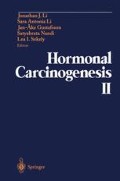Abstract
Prostatic carcinogenesis is a multi-step process involving progression from precancerous cells to cells that uncontrollably proliferate and metastasize. Understanding the molecular events driving the progression is critical to the early detection of and choice of treatment for prostate cancer. The growth and development of prostate cancer appears to be initially androgen-dependent, making it vulnerable to androgen ablation and anti-androgen therapies (1). However, prostate cancer cells gradually lose androgen dependency, and tumor cells which are resistant to endocrine therapy ultimately proliferate. While loss of androgen receptor (AR) expression may accompany loss of androgen dependency and responsiveness (2), other prerequisite cellular events may occur which allow cell proliferation to bypass the androgen requirement. Loss of AR expression may either drive the selection for such events or occur secondarily (3).
Access this chapter
Tax calculation will be finalised at checkout
Purchases are for personal use only
Preview
Unable to display preview. Download preview PDF.
References
Huggins C, Hodges CV (1941) Studies on prostate cancer. I. The effect of castration, of androgen, and androgen injection on serum phosphatases in metastatic carcinoma of the prostate. Cancer Res 1:293–297.
Quarmby VE, Beckman JWC, Cooke DB (1990) Expression and localization of androgen receptor in the R-3327 Dunning rat prostatic adenocarcinoma. Cancer Res 50:735–739.
Darbre PD, King RJB (1987) Progression to steroid insensitivity can occur irrespective of the presence of functional steroid receptors. Cell 51:521–528.
Kokontis J, Takakura K, Hay N, Liao S (1994) Increased androgen receptor activity and altered c-myc expression in prostate cancer cells after long term androgen deprivation. Cancer Res 54: 1566–1573.
Horoszewicz JS, Leong SS, Kawinski E (1983) LNCaP model of human prostatic carcinoma. Cancer Res 43:1809–1818.
Veldscholte J, Ris-Stalpers C, Kuiper GGJM (1990) A mutation in the ligand binding domain of the androgen receptor of human LNCaP cells affects steroid binding characteristics and response to anti-androgens. Biochem Biophys Res Comm 173:534–540.
Kokontis J, Ito K, Hiipakka RA, Liao S (1991) Expression and function of normal and LNCaP androgen receptors in androgen-insensitive human prostatic cancer cells: Altered hormone and antihormone specificity in gene transactivation. Receptor 1:271–279.
Wilding G, Chen M, Gelman EP (1989) Aberrant response in vitro of hormone-responsive prostate cancer cells to anti-androgens. Prostate 14:103–115.
Olea N, Sakabe K, Soto AM, Sonnenscheim C (1990) The proliferative effect of “anti-androgens” on the androgen-sensitive human prostate tumor cell line LNCAP. Endocrinology 126:1457–1463.
Isaacs JT, Coffey DS (1981) Adaptation versus selection on the mechanism responsible for the relapse of prostate cancer to androgen ablation therapy as studied in the Dunning R-3327-H adenocarcinoma. Cancer Res 41:5070–5075.
Wolf DA, Schulz P, Fittier F (1991) Synthetic androgens suppress the transformed phenotype in the human prostate carcinoma cell line LNCaP. Brit J Cancer 64:47–53.
Parker MG, Webb P, Needham M, et al. (1987) Identification of androgen response elements in mouse mammary tumour virus and the rat prostate C3 gene. J Cell Biochem 35:285–292.
Riegman PHJ, Vietstra RJ, Van der Korput JAGM (1991) The promoter of the prostate-specific antigen gene contains a functional androgen responsive element. Mol Endocrin 5:1921–1930.
Liao S, Kokontis J, Sai T, Hiipakka RA (1989) Androgen receptors: Structures, mutations, antibodies and cellular dynamics. J Steroid Biochem Mol Biol 34:41–5651.
Rubin SJ, Hallahan DE, Ashman CR (1991) Two prostate carcinoma cell lines demonstrate abnormalities in tumor suppressor genes. J Surg Oncol 46:31–36.
Bookstein R, Shew JY, Chen PL (1990) Suppression of tumorigenicity of human prostate carcinoma cells by replacing a mutated RB gene. Science 247:712–715
Egawa S, Kadmon D, Miller GJ (1992) Alterations in mRNA levels for growth-related genes after transplantation into castrated hosts in oncogene-induced clonal mouse prostate carcinoma. Mol Carcinogen 5:52–61.
Connolly JM, Rose DP (1990) Production of epidermal growth factor and transforming growth factor-alpha by the androgen-responsive LNCaP human prostate cancer cell line. Prostate 16:209–218.
Wilding G, Valverius E, Knabbe C, Gelmann, EP (1989) Role of transforming growth factor-a in human prostate cancer cell growth. Prostate 15:1–12.
Schuurmans ALG, Bolt J, Voorhorst MM (1988) Regulation of growth and epidermal growth factor receptor levels of LNCaP prostate tumor cells by different steroids. Int J Cancer 42:917–922.
Eaton CL, Davies P, Phillips MEA (1988) Growth factor involvement and oncogene expression in prostatic tumours. J Steroid Biochem 30:341–345.
Ran W, Dean M, Levine RA (1986) Induction of c-fos and c-myc mRNA by epidermal growth factor or calcium ionophore is cAMP dependent. Proc Natl Acad Sci USA 83:8216–8220.
Fleming WH, Hamel A, MacDonald R (1986) Expression of the c-myc proto-oncogene in human prostatic carcinoma and benign prostatic hyperplasia. Cancer Res 46:1526–1531.
Buttyan R, Sawchuk IS, Benson, MC (1987) Enhanced expression of the c-myc protooncogene in high-grade human prostate cancers. Prostate 11:327–337.
Thompson TC, Southgate J, Kitchener G, Land H (1989) Multistage carcinogenesis induced by ras and myc oncogenes in a reconstituted organ. Cell 56:917–930.
Quarmby VE, Beckman J W C, M WE, French FS (1987) Androgen regulation of c-myc messenger ribonucleic acid levels in rat ventral prostate. Mol Endocrinol 1:865–874.
Editor information
Editors and Affiliations
Rights and permissions
Copyright information
© 1996 Springer-Verlag New York, Inc.
About this paper
Cite this paper
Kokontis, J.M., Hay, N., Hiipakka, R.A., Liao, S. (1996). Progression of LNCaP Human Prostate Carcinoma Cells: Androgen Receptor Activity and c-myc Gene Expression. In: Li, J.J., Li, S.A., Gustafsson, JÅ., Nandi, S., Sekely, L.I. (eds) Hormonal Carcinogenesis II. Springer, New York, NY. https://doi.org/10.1007/978-1-4612-2332-0_29
Download citation
DOI: https://doi.org/10.1007/978-1-4612-2332-0_29
Publisher Name: Springer, New York, NY
Print ISBN: 978-1-4612-7506-0
Online ISBN: 978-1-4612-2332-0
eBook Packages: Springer Book Archive

